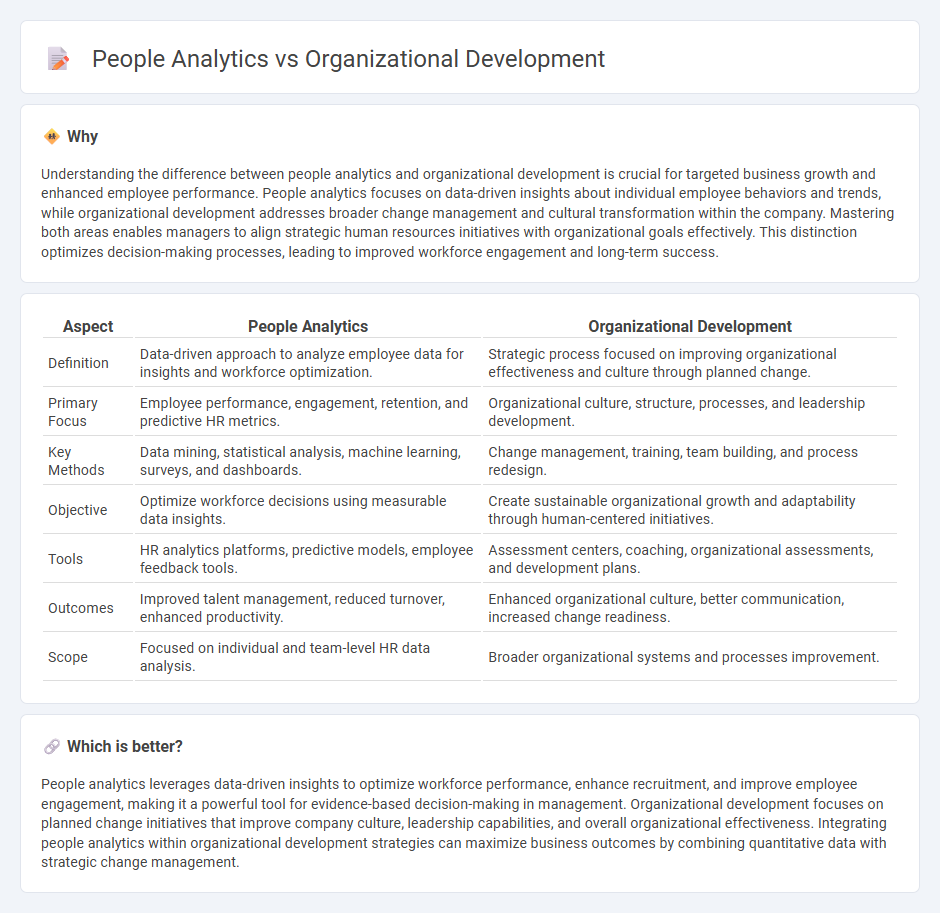
People analytics leverages data-driven insights to enhance talent management, improve employee engagement, and optimize workforce performance through predictive modeling and real-time metrics. Organizational development focuses on strategic change initiatives, culture transformation, and leadership development to align people practices with business goals and drive sustainable growth. Explore how integrating people analytics with organizational development can revolutionize your management approach.
Why it is important
Understanding the difference between people analytics and organizational development is crucial for targeted business growth and enhanced employee performance. People analytics focuses on data-driven insights about individual employee behaviors and trends, while organizational development addresses broader change management and cultural transformation within the company. Mastering both areas enables managers to align strategic human resources initiatives with organizational goals effectively. This distinction optimizes decision-making processes, leading to improved workforce engagement and long-term success.
Comparison Table
| Aspect | People Analytics | Organizational Development |
|---|---|---|
| Definition | Data-driven approach to analyze employee data for insights and workforce optimization. | Strategic process focused on improving organizational effectiveness and culture through planned change. |
| Primary Focus | Employee performance, engagement, retention, and predictive HR metrics. | Organizational culture, structure, processes, and leadership development. |
| Key Methods | Data mining, statistical analysis, machine learning, surveys, and dashboards. | Change management, training, team building, and process redesign. |
| Objective | Optimize workforce decisions using measurable data insights. | Create sustainable organizational growth and adaptability through human-centered initiatives. |
| Tools | HR analytics platforms, predictive models, employee feedback tools. | Assessment centers, coaching, organizational assessments, and development plans. |
| Outcomes | Improved talent management, reduced turnover, enhanced productivity. | Enhanced organizational culture, better communication, increased change readiness. |
| Scope | Focused on individual and team-level HR data analysis. | Broader organizational systems and processes improvement. |
Which is better?
People analytics leverages data-driven insights to optimize workforce performance, enhance recruitment, and improve employee engagement, making it a powerful tool for evidence-based decision-making in management. Organizational development focuses on planned change initiatives that improve company culture, leadership capabilities, and overall organizational effectiveness. Integrating people analytics within organizational development strategies can maximize business outcomes by combining quantitative data with strategic change management.
Connection
People analytics leverages data-driven insights to enhance decision-making in organizational development by identifying talent trends, employee engagement levels, and skill gaps. Integrating people analytics enables targeted interventions that improve workforce productivity, organizational culture, and change management strategies. This connection drives measurable business outcomes through evidence-based development initiatives aligned with strategic goals.
Key Terms
Organizational Development:
Organizational Development (OD) focuses on improving company culture, enhancing employee performance, and fostering change management through strategic interventions and training programs. Unlike People Analytics, which relies heavily on data analysis to make decisions, OD emphasizes human-centered approaches and behavioral science to drive sustainable organizational growth. Explore how integrating OD practices can transform workplace dynamics and boost overall organizational effectiveness.
Change Management
Organizational development centers on strategic change management, enhancing company culture, and improving processes to drive long-term growth. People analytics leverages data-driven insights to optimize employee performance, engagement, and talent retention, supporting informed decision-making during transitions. Explore how these approaches complement each other to create effective change management strategies.
Organizational Culture
Organizational development emphasizes cultivating a positive organizational culture through structured change initiatives and leadership engagement to enhance overall performance. People analytics uses data-driven insights to measure and analyze cultural dynamics, employee behavior, and engagement patterns, providing actionable intelligence for targeted improvements. Explore how integrating organizational development with people analytics can transform workplace culture effectively.
Source and External Links
What Is Organizational Development? A Complete Guide - AIHR - Organizational development is a planned, structured process of change aimed at supporting organizational growth, innovation, and cultural transformation through defined stages such as diagnosis, intervention, and evaluation.
What is Organizational Development? - IBM - Organizational development is a systematic effort to improve an organization's performance, effectiveness, and adaptability by changing its strategies, procedures, and culture, with a focus on research-driven, sustainable transformation.
What Is Organization Development? (TD.org) - Organization development is a holistic, science-backed approach that enhances organizational capability by aligning strategy, structure, people, and processes, emphasizing continuous improvement and problem-solving through systematic, long-range interventions.
 dowidth.com
dowidth.com